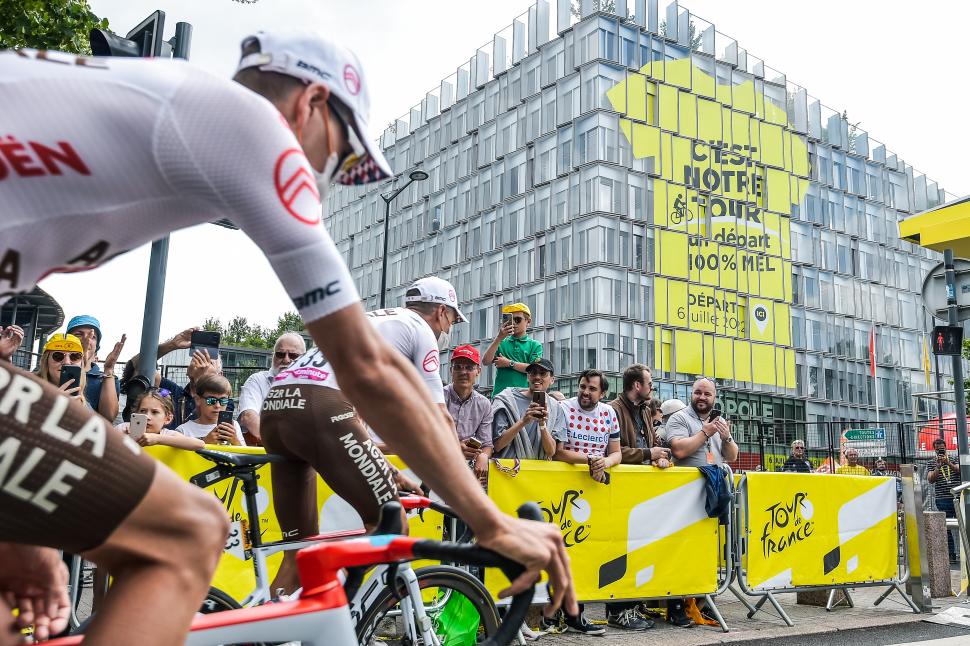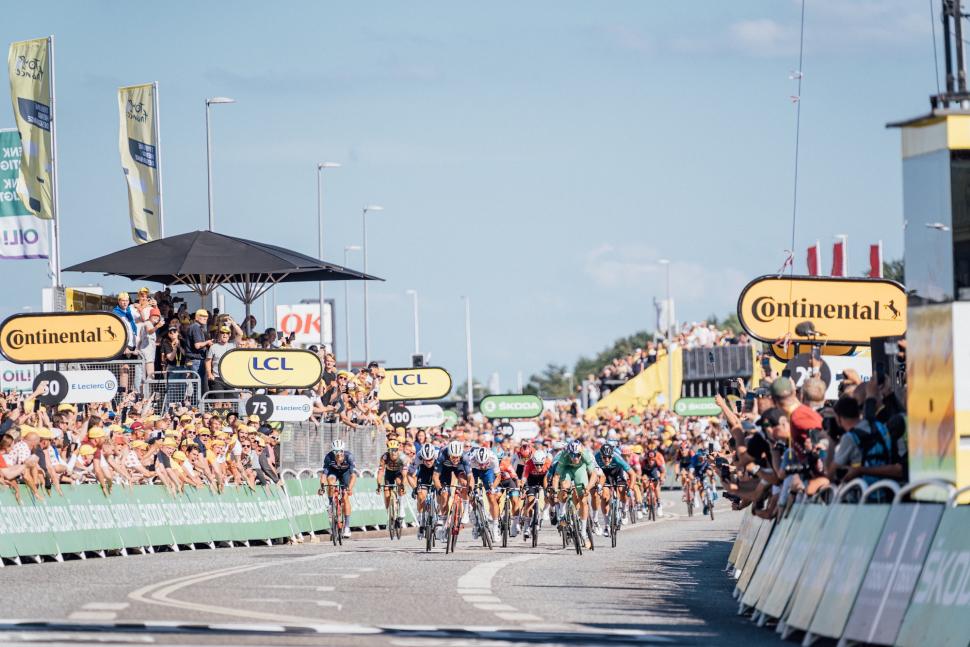- News
- Reviews
- Bikes
- Components
- Bar tape & grips
- Bottom brackets
- Brake & gear cables
- Brake & STI levers
- Brake pads & spares
- Brakes
- Cassettes & freewheels
- Chains
- Chainsets & chainrings
- Derailleurs - front
- Derailleurs - rear
- Forks
- Gear levers & shifters
- Groupsets
- Handlebars & extensions
- Headsets
- Hubs
- Inner tubes
- Pedals
- Quick releases & skewers
- Saddles
- Seatposts
- Stems
- Wheels
- Tyres
- Tubeless valves
- Accessories
- Accessories - misc
- Computer mounts
- Bags
- Bar ends
- Bike bags & cases
- Bottle cages
- Bottles
- Cameras
- Car racks
- Child seats
- Computers
- Glasses
- GPS units
- Helmets
- Lights - front
- Lights - rear
- Lights - sets
- Locks
- Mirrors
- Mudguards
- Racks
- Pumps & CO2 inflators
- Puncture kits
- Reflectives
- Smart watches
- Stands and racks
- Trailers
- Clothing
- Health, fitness and nutrition
- Tools and workshop
- Miscellaneous
- Buyers Guides
- Features
- Forum
- Recommends
- Podcast
 2022 Tour de France (Copyright: A.S.O/Charly Lopez)
2022 Tour de France (Copyright: A.S.O/Charly Lopez)Cycling UK slams Northern Ireland's "baffling" Tour de France bid when active travel strategy puts cyclists "at risk"
Cycling UK has criticised Northern Ireland's joint bid with the Republic of Ireland to host the Tour de France's Grand Départ in 2026 or 2027, calling it "baffling" when everyday safety policy is still putting cyclists "at risk" and omits recent Highway Code changes.
The charity's spokesperson in Northern Ireland, Andrew McClean, stressed that whilst Cycling UK would "love" to see the race return to the island of Ireland, "a real lasting legacy for cycling would be for Northern Ireland to stop ignoring the essential work required to help people travel cheaply, sustainably and safely by bike".
[📷: Zac Williams/SWpix.com]
The comments come as the Department for Infrastructure proposed its Road Safety Strategy for Northern Ireland — aiming to support policy on sustainability, economic development, climate change and active travel — but, Cycling UK says, it does not encourage active travel as it fails to protect vulnerable road users and "further entrenches car dependency".
> Government says Belfast cycle lanes blocked by parked cars are merely "advisory"
Cycling UK and other active travel organisations provided advice during the consultation period, and specifically recommended the 'hierarchy of road users' from January's Highway Code changes was implemented into the strategy, something which has not been done.
"The DfI's proposed strategy will put our most vulnerable road user's safety at risk," Mr McClean warned.
"Less than three per cent of trips in Northern Ireland are taken by bike, and this strategy will stall this figure for even longer if they fail to acknowledge vulnerable road users in this strategy.
"The report states that one of the biggest barriers to active travel is the fact that pedestrians and cyclists simply don't feel safe moving alongside traffic, yet the use of antiquated terms like 'shared responsibility' fails to take this into account.
"The introduction of hierarchy of road users in Britain's Highway Code was a move away from the outdated notion of equal responsibility and a recognition those presenting the danger on our roads bore greater responsibility – but this progression has been ignored in Northern Ireland."
> Northern Ireland cyclists "taking their life in their hands" on rural roads
Back in September, Cycling UK accused a Sinn Féin minister of "neglecting Northern Ireland's future" and "locking us all into a fossil-fuelled dark age" after he appeared to renege on a pre-election pledge to introduce an Active Travel Act in Northern Ireland.
Cycling UK also highlighted the timing of the Tour de France bid, suggesting a government failing to take the safety of utility and leisure cyclists seriously has "no credibility if it then submits a bid to host the world's biggest race".
"Cycling UK would love to see the Tour return to the island of Ireland, but a real lasting legacy for cycling would be for Northern Ireland to stop ignoring the essential work required to help people travel cheaply, sustainably and safely by bike," Mr McClean continued.
"It's baffling Northern Ireland will put so much care, attention and likely funding into hosting the Tour de France for a couple of days while failing to make every day cycling safer."
€30 million Grand Départ
News of the Irish bid dropped last month, with murmurs of discontent from some who suggested the estimated €30 million cost of hosting the Grand Départ would be better spent elsewhere.
Ireland's Minister of State for Sports, Jack Chambers predicted costs of between €20 million and €30 million to be shared by the north and south, prompting some to question if the investment would be better spent on infrastructure, or even on the sport at a grassroots level.
The Tour de France has only visited Ireland once, but never the north, back in 1998 when the sporting occasion was overshadowed by scandal as a host of drugs and doping products were found with a Festina team soigneur as he crossed the French-Belgian border days before the Dublin start.
Grand Tour racing returned to Ireland in 2014, visiting Northern Ireland too, as the Giro d'Italia began with three stages on the island, starting with a team time trial in Belfast.
Dan is the road.cc news editor and joined in 2020 having previously written about nearly every other sport under the sun for the Express, and the weird and wonderful world of non-league football for The Non-League Paper. Dan has been at road.cc for four years and mainly writes news and tech articles as well as the occasional feature. He has hopefully kept you entertained on the live blog too.
Never fast enough to take things on the bike too seriously, when he's not working you'll find him exploring the south of England by two wheels at a leisurely weekend pace, or enjoying his favourite Scottish roads when visiting family. Sometimes he'll even load up the bags and ride up the whole way, he's a bit strange like that.
Latest Comments
- StevenCrook 1 min 14 sec ago
But only if the police recover it. Once it's been sold on? The chances of that are vanishingly small....
- Bigfoz 8 min 13 sec ago
With WBD having taken Discovery+ sports behind a significant paywall (Cycling, SPorts cars, Superbikes, MotoGP, British Superbikes etc etc)...
- biking59boomer 15 min 29 sec ago
TBH, this kind of stupidity is best ignored. By publicly responding we're giving them free publicity.
- biking59boomer 25 min 32 sec ago
Unfortunately politics is the problem. Our councillors pander to the anti-cyclist NIMBYs, especially when local elections are due. The government...
- biking59boomer 30 min 52 sec ago
Only if you're aiming it at over 60s
- hawkinspeter 58 min 52 sec ago
I'd like to see more Chinese products being reviewed as there's some interesting tech available there (e.g. carbon spoke wheels at a relatively...
- hawkinspeter 1 hour 25 min ago
Can't we just move them to Guernsey? https://www.bbc.co.uk/news/articles/crrdnkyvpjgo
- webbierwrex 1 hour 42 min ago
Nice looking wheels but I can't afford that. I'm looking for some nice, wide wheels to optimally run 32mm tyres on.
- Miller 2 hours 30 sec ago
Wow! Pogacar does not shy away from top competition. This is fantastic. And I am going to be there.

Add new comment
6 comments
Professional cycling is dirty, corrupt and amoral. Active travel is clean, ethical and moral. I know what I would like my government to support. Furthermore, the hour is late.
As a cyclist and driver in NI, I really dislike when public cycling policy is conflated with road racing events. Having the TdF here would be a wonderful idea and would be fantastic for NI in countless ways, not to mention the benefits of having cross-border co-operation. It has very little, if not nothing, to do with road safety policy and the money for this is not being taken away from road safety.
This is just an easy way for Cycling UK to get their name in the news. Realistically all it will do is reduce the chances of the TdF coming, it won't have any impact on road safety. I cycle to work regularly but I am in the minority because we have a low population density and many people travel large distances to work, public transport is crap and we have shit weather. Not everywhere is a metropolitan utopia for active travel.
You'd be right if they were saying this about BMX or a track event. Sport is little to do with transport, it's true, but this is road cycling. So it is related even if it's just that the training for the sport ("inspire the next generation of competitive cyclists") takes place... on the roads. Presumably not every road cyclist gets their start in the velodome or on purely recreational off-road paths? And some events (at least in England / Scotland) are on open or partially closed roads.
So I don't see this as bandwaggon (band-bakfiets? Fietsorkest?) -jumping. I doubt the TdF organisers will give a tinker's cuss about what Cycling UK say. Now if it was British Cycling, possibly?
Cycling UK has very little traction in Northern Ireland. All club members have to be a member of Cycling Ireland. Cycling Ulster is an affiliate of Cycling Ireland, so nothing to do with Cycling UK. There are proposals in place to invest £2m a year until 2031 to increase cycle lanes in Belfast to 194km. Creating a significant network. Considering that Belfast's population is 600k that's quite a significant network.
Eraserbike is right though commuting to work by bike is hard enough to do. I can count the amount of people on one hand that I know regularly commute 10 miles+ from outlaying towns of Belfast. As he says then there is of course the weather!
Thanks - again I'm wondering if folks are confusing British Cycling (the sporty side - as Cycling Ulster / Cycling Ireland appear to be) with Cycling UK (used to be Cyclists' Touring Club, leans more towards the "cycling for everyone" including commuting as well as "recreational")? IMHO it makes sense for CUK to be pointing out poor general provision for cycling in a sporting context where cycling is on the roads. Unless again the competition was e.g. artistic cycling / muni and thus less likely to be anywhere near the roads.
Whether they should be commenting on things across the Irish sea (over the invisible border which may not really be there anyway) is another story!
Not having their main focus on cycle racing as a sport I doubt there's cause for concern that them saying something will have anything to do with where the TdF is staged.
I can imagine - that as a rural and extremely wet place - Ireland is challenging for those who cycle commute! I heard Belfast has a bit of a car addiction / clogged arteries issue also (haven't been for years though).
Nowhere in the UK is!